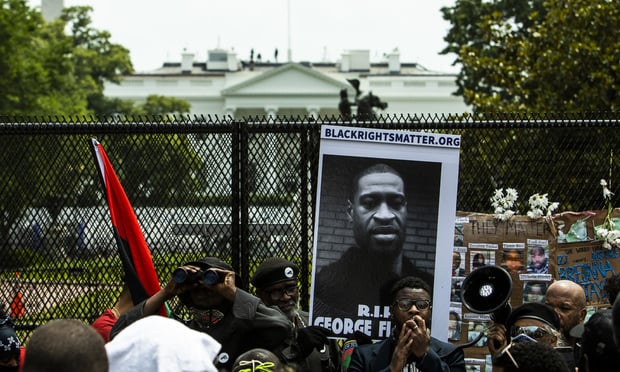The Crippling Impact of Anti-Black Racism, and How Allies Can Act Against It
There is no better time for everyone in the legal community to listen and learn—and act as an ally.
June 18, 2020 at 01:46 PM
12 minute read
 Thousands marched June 6 in Washington, D.C., protesting police brutality and the killing of George Floyd in Minnesota at the hands of local police. Photo: Diego M. Radzinschi/ALM
Thousands marched June 6 in Washington, D.C., protesting police brutality and the killing of George Floyd in Minnesota at the hands of local police. Photo: Diego M. Radzinschi/ALM
Years ago, at a social event, a partner at a leading law firm remarked on a series of police brutality cases in the press at that time and earnestly asked me why the black community in the United States had such a strained relationship with police forces. My response, I believe, led him to understand better the historical context for the relationship and has helped make him a better ally today.
In the past few weeks, a series of incidents similar to many throughout U.S. history have ignited a necessary national conversation on anti-black racism. They include the killings of Breonna Taylor and George Floyd by police; the killing of Ahmaud Arbery by a former police officer enacting vigilante justice; and a conflict in New York's Central Park where a white woman, Amy Cooper, told the police falsehoods about a black man, Christian Cooper, evoking the trauma of Emmett Till in the collective black American psyche.
We appear to have arrived at a watershed moment for global learning and change. The world is watching America to see how we will address our current civil disruption. Yet few countries are less adequately prepared for that conversation.
My role in corporate America as a diversity, equity and inclusion professional focuses on understanding the challenges to inclusion and promoting dialogues about difference that lead to positive change. As a black American woman raised by a family that taught me about the issues of race in stark terms from a very young age, I would like to bring a similar unflinching perspective to the current discussion.
Here are some perspectives on anti-black racism in the U.S. and how everyone can be an effective ally in stopping the horrific, crippling impact of racial bias.
America, Race and Our Collective Amnesia
American culture is powerfully rooted in founding precepts of individual "liberty and justice for all" and a "pull yourself up by your bootstraps" meritocracy, where everyone who works hard can achieve the "American dream." But our dependence on a narrative of exceptionalism—so critical to our identity as a global power and a "first-world" role model—includes a strenuous unwillingness to examine other truths. The U.S. government shunted millions of Native Americans from their own lands to unfamiliar areas, with millions dying in the process, and it exploited and murdered millions of enslaved Africans during nearly 250 years of a brutal trans-Atlantic slave trade.
I have always been curious about why Americans refuse to discuss this core aspect of our origins, particularly in light of the actions of other countries.
For example, in the last 70 years, governments in Germany, South Africa and Australia have acknowledged their wrongdoing and taken steps to right the wrongs of prior generations. In 1952, West Germany and Israel negotiated an agreement on reparations, where West Germany agreed to pay $845 million to compensate Holocaust survivors, followed by Germany's engagement in Vergangenheitsbewältigung—a process to come to terms with the past. More than 20 years ago, South Africa's Truth and Reconciliation Act opened a path to talking about the individual and systemic wrongs committed during 43 years of apartheid. Australia's Reconciliation Act Plan is a framework that encourages workplaces, schools, government and community organizations to acknowledge the history of exploiting Aboriginal peoples and make amends.
These types of acknowledgement stand in stark contrast to the U.S., where the contributions of black Americans are severely minimized in stories of founding and building our nation. U.S. educators seem only willing to focus on the civil rights movement. Myths common in U.S. textbooks for generations included that some slave owners treated enslaved people kindly and that black Americans were better off enslaved than free. Today we have different versions of history textbooks for "red" and "blue" states. Not until 2016 did the Smithsonian National Museum of African American History and Culture grace the nation's capital, following decades of efforts to highlight the contributions of African Americans.
Why don't most of us understand how we got to this point today?
America's myth-making regarding our identity and founding ignores slavery, to avoid underscoring that the capitalism we revere requires understanding the brutality of slave plantations. It avoids acknowledging how American democracy is rooted in the belief that some people are entitled to more rights than others.
The Pulitzer Prize-winning New York Times series The 1619 Project reframes U.S. history to view 1619 as our nation's birth year, when a ship arrived at Point Comfort in the colony of Virginia, bearing a cargo of dozens of enslaved Africans. The editors note this places "the consequences of slavery and the contributions of black Americans at the very center of the story we tell ourselves about who we are as a country." Out of slavery and the anti-black racism it required "grew nearly everything that has made America truly exceptional: its economic might, its industrial power, its electoral system … its astonishing penchant for violence, its income inequality … and the endemic racial fears and hatreds that continue to plague it to this day."
So what is the impact of this abridged history lesson and collective amnesia?
Most Americans have a poor understanding of why the majority of black Americans have a vastly different, and decidedly more negative, lived experience than the majority of white Americans. The pain of this is beautifully illustrated in Proctor & Gamble's The Look. This negative experience typically has come from white Americans, and particularly at the hands of law enforcement. Even advanced education, wealth and other forms of class pedigree do not exempt black Americans from the dangers of different treatment.
My answer to my partner colleague's question at a firm event: A significant source of trauma experienced by enslaved Americans and their descendants came from the slave patrols charged to protect human property—the progenitors of our modern day police forces. Many law enforcement officers were members of the Ku Klux Klan, formed in the post-slavery Reconstruction era, and wore their badges as they terrorized members of the black community. A white supremacist presence still remains in many American police forces. Black American mistrust of law enforcement, often activated to defend unjust laws, runs long and deep.
Privilege and White Supremacy
One of the strongest tools in bolstering America's collective and socially reinforced amnesia regarding its legacy of slavery and racism is the myth of white supremacy. The refusal or hesitation to discuss slavery or acknowledge the white supremacy that enabled it requires a willful blindness and silence regarding its discriminatory present-day impact.
On a personal level, in my work as a diversity, equity and inclusion professional, I am often struck by how strenuously some deny the existence of bias or privilege, even without realizing they're doing so.
In just one example, several years ago I worked on a project to increase diversity in the legal profession. One of my colleagues was a partner from a different law firm. After several weeks of cordial, productive meetings, I was surprised when he informed me that he "hates when people say he has privilege as a white male," explaining that it implied he had not worked hard to achieve partnership at a major law firm. As I discussed in the podcast Heels of Justice last year, one of the biggest issues that keeps me awake at night is the existence of backlash to diversity and inclusion initiatives, viewed as a threat meant to take something that "fairly belongs" to one group and "unfairly redistribute" it to another. I didn't believe he was a bad guy whom I would label a racist, but the continuum that spans from racist to ally includes a range of blind spots and unconscious biases.
A graphic called The Racism Scale illustrates comments and thoughts that reveal biases, which initially might not seem hurtful. Many of these biases stem from America's general ignorance regarding our history of white supremacy and constitute serious microaggressions in their impact on those who are not white. Comments like "I don't see color," "We should focus on what unites us, not what divides us," "All lives matter," "I support peaceful protests," and "I'm not racist" harm in all the ways described here.
Peggy McIntosh's seminal work White Privilege: Unpacking the Invisible Knapsack explains that many are taught to see racism only in individual acts, not in the invisible systems that confer dominance on their group. Further, even if we're able to see some as disadvantaged and want to help, we are far more reluctant to see how society might provide us certain unearned advantages such that our ability to progress is made easier. As a white woman, McIntosh served as a powerful ally by identifying 50 daily effects of white privilege in her life that her African American coworkers, friends, and acquaintances could not regularly rely upon. Re-reading her last condition gave me chills: "I will feel welcomed and 'normal' in the usual walks of public life, institutional and social."
Acknowledging that racial difference drives inequality is difficult. Neuroscience shows human beings overestimate the disadvantageous headwinds they encounter in life and underestimate their advantageous tailwinds. Barriers and hindrances command attention because they must be overcome; benefits and resources can often be simply enjoyed and largely ignored.
Four things lead to a breakdown in awareness of racial differences and racism:
- No race dialogue (so no available examples of others' hardships)
- Benefits and privileges bestowed to white people, due to an entrenched, hidden culture of white supremacy
- We overestimate our own headwinds and underestimate our tailwinds
- We underestimate others' headwinds and overestimate their tailwinds, thus failing to acknowledge Black people's obstacles.
How to Be an Ally
The key to progress forward is educating ourselves on the truth of our past and its impact on the present, followed by acting to mitigate the destruction of so many lives caused by anti-black racism.
Even through my great sadness and pain at our current state of affairs, my hope in love and humanity endures. This strengthens every time I see someone step up to act as an ally instead of as a bystander.
Start by educating yourself on the issues marginalizing black Americans. Explore The 1619 Project podcast and the National Museum of African American History and Culture's web portal Talking About Race, which is designed to help individuals, families and communities talk about racism, racial identity and how these forces shape society. I recommend an article by Issac Eloi on racism in the UK, America's "parent" country. Finally, I will always look to the brilliant Toni Morrison to help America understand its racism.
Note that I said educate yourself. Unless a person of color offers, please don't place the onus of explaining racism, its impact and how you can help solve it on those suffering its burdens. People of color, particularly black Americans, are utterly exhausted by the centuries of work to make white people understand and become comfortable with our very existence.
Survey your sources of privilege and use them to help others. Awareness begins with ourselves, and that self-inventory is not easy. Ask yourself: What sacrifices are you making to progress those who are disadvantaged by bias? Who are you shielding from consistently being overlooked for career-defining work assignments, leadership opportunities, or promotions? For whom are you stepping aside so they can take center stage on a pitch for new business or an important meeting with a client? Are you only providing access to the same homogeneous groups?
Become an anti-racist and fight the systems perpetuating racial inequality. Americans are taught that being fair means applying the law and all other rules in society to all equally. This approach is not sufficient to achieve fairness in a world shaped by historical, unearned privilege.
Achieving equity requires understanding not only the current experience of marginalization and oppression, but also the historical legacy of slavery, disenfranchisement and exclusion from most forms of opportunity: housing discrimination, voter suppression, lack of investment in education, employment and wage discrimination, and much more. It requires understanding that not everyone starts at the same place, and more must be done for those historically left behind in order to achieve fairness and a level playing field. Ask yourself: How can you step up publicly to support equity?
Let's all start with advice from "How to Be an Anti-Racist" by Ibram X. Kendi, who notes it "requires persistent self-awareness, constant self-criticism, and regular self-examination." While it will require a painful acknowledgement of America's origins and original sin, there is no better time to embrace the worst of who we have been in order to finally embody the truth of the greatness we claim.
Maja Hazell is the global head of diversity and inclusion at White & Case.
This content has been archived. It is available through our partners, LexisNexis® and Bloomberg Law.
To view this content, please continue to their sites.
Not a Lexis Subscriber?
Subscribe Now
Not a Bloomberg Law Subscriber?
Subscribe Now
NOT FOR REPRINT
© 2025 ALM Global, LLC, All Rights Reserved. Request academic re-use from www.copyright.com. All other uses, submit a request to [email protected]. For more information visit Asset & Logo Licensing.
You Might Like
View All
Saul Ewing Loses Two Partners to Fox Rothschild, Marking Four Fla. Partner Exits in Last 13 Months
3 minute read
Dentons Taps D.C. Capital Markets Attorney for New US Managing Partner

Exceptional Growth Becoming the Rule? Demand Drove Strong Year for Big Law

Eagles or Chiefs? At These Law Firms, Super Bowl Sunday Gets Complicated
3 minute readLaw Firms Mentioned
Trending Stories
- 1Parties’ Reservation of Rights Defeats Attempt to Enforce Settlement in Principle
- 2ACC CLO Survey Waves Warning Flags for Boards
- 3States Accuse Trump of Thwarting Court's Funding Restoration Order
- 4Microsoft Becomes Latest Tech Company to Face Claims of Stealing Marketing Commissions From Influencers
- 5Coral Gables Attorney Busted for Stalking Lawyer
Who Got The Work
J. Brugh Lower of Gibbons has entered an appearance for industrial equipment supplier Devco Corporation in a pending trademark infringement lawsuit. The suit, accusing the defendant of selling knock-off Graco products, was filed Dec. 18 in New Jersey District Court by Rivkin Radler on behalf of Graco Inc. and Graco Minnesota. The case, assigned to U.S. District Judge Zahid N. Quraishi, is 3:24-cv-11294, Graco Inc. et al v. Devco Corporation.
Who Got The Work
Rebecca Maller-Stein and Kent A. Yalowitz of Arnold & Porter Kaye Scholer have entered their appearances for Hanaco Venture Capital and its executives, Lior Prosor and David Frankel, in a pending securities lawsuit. The action, filed on Dec. 24 in New York Southern District Court by Zell, Aron & Co. on behalf of Goldeneye Advisors, accuses the defendants of negligently and fraudulently managing the plaintiff's $1 million investment. The case, assigned to U.S. District Judge Vernon S. Broderick, is 1:24-cv-09918, Goldeneye Advisors, LLC v. Hanaco Venture Capital, Ltd. et al.
Who Got The Work
Attorneys from A&O Shearman has stepped in as defense counsel for Toronto-Dominion Bank and other defendants in a pending securities class action. The suit, filed Dec. 11 in New York Southern District Court by Bleichmar Fonti & Auld, accuses the defendants of concealing the bank's 'pervasive' deficiencies in regards to its compliance with the Bank Secrecy Act and the quality of its anti-money laundering controls. The case, assigned to U.S. District Judge Arun Subramanian, is 1:24-cv-09445, Gonzalez v. The Toronto-Dominion Bank et al.
Who Got The Work
Crown Castle International, a Pennsylvania company providing shared communications infrastructure, has turned to Luke D. Wolf of Gordon Rees Scully Mansukhani to fend off a pending breach-of-contract lawsuit. The court action, filed Nov. 25 in Michigan Eastern District Court by Hooper Hathaway PC on behalf of The Town Residences LLC, accuses Crown Castle of failing to transfer approximately $30,000 in utility payments from T-Mobile in breach of a roof-top lease and assignment agreement. The case, assigned to U.S. District Judge Susan K. Declercq, is 2:24-cv-13131, The Town Residences LLC v. T-Mobile US, Inc. et al.
Who Got The Work
Wilfred P. Coronato and Daniel M. Schwartz of McCarter & English have stepped in as defense counsel to Electrolux Home Products Inc. in a pending product liability lawsuit. The court action, filed Nov. 26 in New York Eastern District Court by Poulos Lopiccolo PC and Nagel Rice LLP on behalf of David Stern, alleges that the defendant's refrigerators’ drawers and shelving repeatedly break and fall apart within months after purchase. The case, assigned to U.S. District Judge Joan M. Azrack, is 2:24-cv-08204, Stern v. Electrolux Home Products, Inc.
Featured Firms
Law Offices of Gary Martin Hays & Associates, P.C.
(470) 294-1674
Law Offices of Mark E. Salomone
(857) 444-6468
Smith & Hassler
(713) 739-1250










